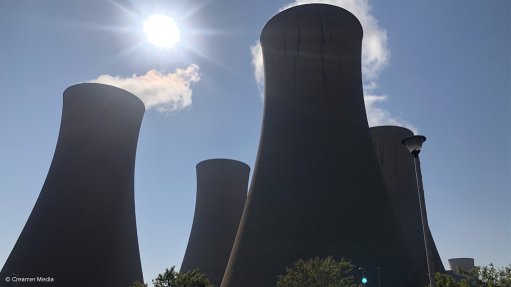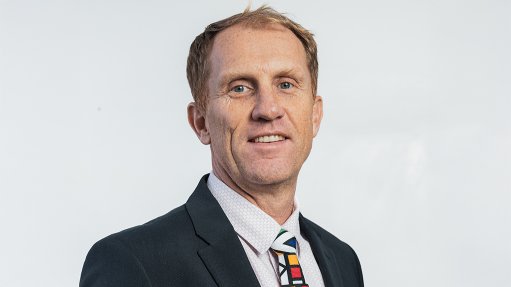Gas key as South Africa transitions to clean energy
Gas will be needed to help meet energy demand in South Africa during the necessary transition to clean energy, speakers from the energy sector, academia, financial institutions and South African government departments said during a webinar on October 27.
They noted, however, that South Africa has not yet put in place the required policies and regulations, trade agreements and infrastructure needed to ensure it is able to use natural gas.
During a virtual seminar under the theme 'Opportunities in the Transitioning South African Energy Sector', hosted by energy technology multinational Siemens Energy, speakers spoke about the role of gas in the transition and then focused on the early-stage green hydrogen economy, which requires a diverse range of supporting policies, infrastructure, skilled people and small and large businesses to realise the potential developmental impact that the transition presents.
"Gas is useful to facilitate the energy transition in South Africa. Natural gas will play a role in the transition as we move to carbon-free energy systems. Gas-fired power will have huge social and governance impacts in terms of ensuring energy security, while reducing the carbon footprint of electricity compared with coal- and oil-fired power plants," said Siemens Energy Southern and Eastern Africa MD Thabo Molekoa.
"Gas-fired and combined-cycle power plants can balance the supply from renewable energy sources and stabilise grids. This makes gas a key technology in decarbonisation, as it is flexible and complementary to the development of clean energy. To successfully transition the economy, security of supply is as important as expanding renewable energy," he said.
Gas will be necessary to bridge the gap in supply as other technologies and their markets mature, and demand for gas will triple to 2035 when it is expected to plateau, concurred Wits Business School head Maurice Radebe.
He added that the gas finds in Mozambique were of international significance and said South Africa urgently needs to collaborate and cooperate with Mozambique, as well as prepare its infrastructure, ports, industries and economy to get gas to its economic heartlands.
"However, South Africa has not added one megawatt of energy from gas, despite being in the midst of load-shedding that harms small businesses and the economy. Current gas demand of about 173 petajoules a year far exceeds supply. This requires urgent focus through the development of a specific South African energy plan separate from the Integrated Resource Plan (IRP 2019)," he said.
The IRP 2019 makes provision for 3 GW of gas, which had been reduced from the 8 GW in the draft IRP of 2018, owing mainly to practical constraints, including suitable infrastructure, said Department of Mineral Resources and Energy (DMRE) Programmes and Projects deputy director-general Jacob Mbele.
"From the DMRE's point of view, South Africa is sitting with a significant requirement for gas to complement the renewable energy sources we intend to put into the energy system. A review process and various initiatives are under way, with amendments to the Gas Act submitted to Parliament for which public consultations are expected to start in November.
"The amendments aim to facilitate the orderly development of infrastructure and provide space for new technologies in the sector and clearly provides for public-private cooperation. Work on the gas masterplan is also at an advanced stage," he said.
Gas is necessary not only to improve power production to meet demand, but South Africa also needs the increased capacity and flexibility to manage system dynamics, including renewable energy sources, said Mbele.
Standard Bank Oil and Gas Southern Africa head Paul Eardley-Taylor pointed out that 3.5-million tonnes of liquefied natural gas (LNG) from Mozambique could complety remove the 4 GW to 6 GW deficit in generation capacity Eskom was experiencing that resulted in load-shedding, but South Africa had not bought even a single ton of LNG from Mozambique from the new fields.
"[Oil and gas major] BP has contracted for 3.4-million tonnes, 11-million tonnes have been allocated to other markets, including key Asian markets, and UK gas providers have bought gas from Mozambique. This gas market and industry will happen with or without South Africa's interest or involvement, although we hope South Africa will become involved and make gas available for customers, independent power producers and trucks, as examples, across the country to achieve security of supply," he said.
Similarly, when looking at pricing of about $8 per gigajoule for LNG, South Africa should be able to buy the gas at less than $50/bl compared with the $80/bl it was paying for diesel. Diesel generators are only about 30% efficient, while gas-to-power is about 60% efficient, which would lead to a long-term price of about R1.30/kWh and a cost to consumers of about R1.60/kWh to R1.70/kWh at a much lower carbon intensity, he noted.
Further, some gas turbines can operate completely or partially on hydrogen gas and Siemens aims to ensure that all its gas turbines are able to operate completely on hydrogen by 2030 to ensure its turbines are an integral part of a carbon-neutral energy system, added Molekoa.
"Hydrogen has been dubbed the versatile molecule, because it is an efficient and carbon-free energy carrier, and one that also has underlying potential to develop the economic landscape in South Africa for the better. Although unlocking this potential requires developing the value chains and commercialisation of the technology, there are many applications that may benefit from using hydrogen," he said.
"As the industry evolves and matures, many more applications will be identified and transformed, from transportation to industrial applications and even the possible export of hydrogen, as well as local public and private transport. Hydrogen also holds promise for long-term relevance and sustainability, such as the use of hydrogen to produce carbon-free synthetic fuels for aviation," said Molekoa.
Siemens also viewed the role of small businesses in co-development and co-creation of hydrogen value chains as crucial and there are key roles that need to be filled by smaller companies in the development of hydrogen value chains, said Siemens Energy Middle East and Africa New Energy head Manuel Kuehn.
State-owned industrial investment organisation the Industrial Development Corporation (IDC) has identified component manufacturing as a significant opportunity for smaller businesses and new entrepreneurs to become part of the sector, said IDC COO Joanne Bate.
Development finance institutions and other funders have a role to play in the early stages and to invest in early-stage projects to enable business cases of these technologies to become better known, reduce costs in the value chain and accelerate development of the industry.
"For example, investments to support electrolyser production in South Africa is a key investment area, owing to South Africa's resources of platinum-group metals. We need to seize the opportunities in the early stages, as South Africa has a large competitive advantage, if we can get the policies, technology and funding right," she said.
Article Enquiry
Email Article
Save Article
Feedback
To advertise email advertising@creamermedia.co.za or click here
Press Office
Announcements
What's On
Subscribe to improve your user experience...
Option 1 (equivalent of R125 a month):
Receive a weekly copy of Creamer Media's Engineering News & Mining Weekly magazine
(print copy for those in South Africa and e-magazine for those outside of South Africa)
Receive daily email newsletters
Access to full search results
Access archive of magazine back copies
Access to Projects in Progress
Access to ONE Research Report of your choice in PDF format
Option 2 (equivalent of R375 a month):
All benefits from Option 1
PLUS
Access to Creamer Media's Research Channel Africa for ALL Research Reports, in PDF format, on various industrial and mining sectors
including Electricity; Water; Energy Transition; Hydrogen; Roads, Rail and Ports; Coal; Gold; Platinum; Battery Metals; etc.
Already a subscriber?
Forgotten your password?
Receive weekly copy of Creamer Media's Engineering News & Mining Weekly magazine (print copy for those in South Africa and e-magazine for those outside of South Africa)
➕
Recieve daily email newsletters
➕
Access to full search results
➕
Access archive of magazine back copies
➕
Access to Projects in Progress
➕
Access to ONE Research Report of your choice in PDF format
RESEARCH CHANNEL AFRICA
R4500 (equivalent of R375 a month)
SUBSCRIBEAll benefits from Option 1
➕
Access to Creamer Media's Research Channel Africa for ALL Research Reports on various industrial and mining sectors, in PDF format, including on:
Electricity
➕
Water
➕
Energy Transition
➕
Hydrogen
➕
Roads, Rail and Ports
➕
Coal
➕
Gold
➕
Platinum
➕
Battery Metals
➕
etc.
Receive all benefits from Option 1 or Option 2 delivered to numerous people at your company
➕
Multiple User names and Passwords for simultaneous log-ins
➕
Intranet integration access to all in your organisation


















